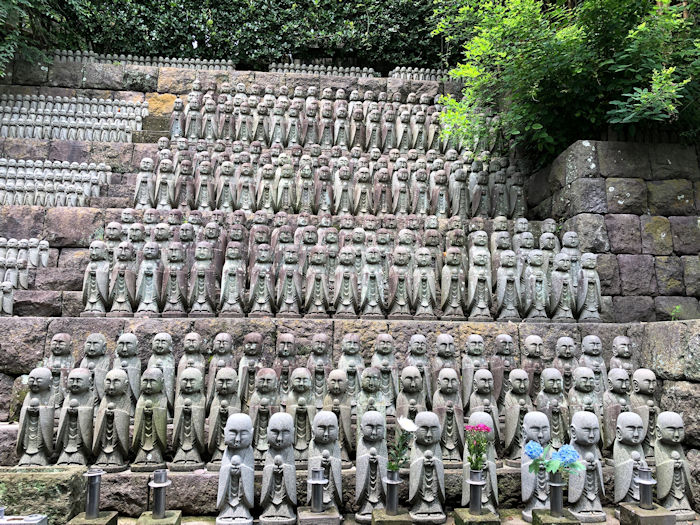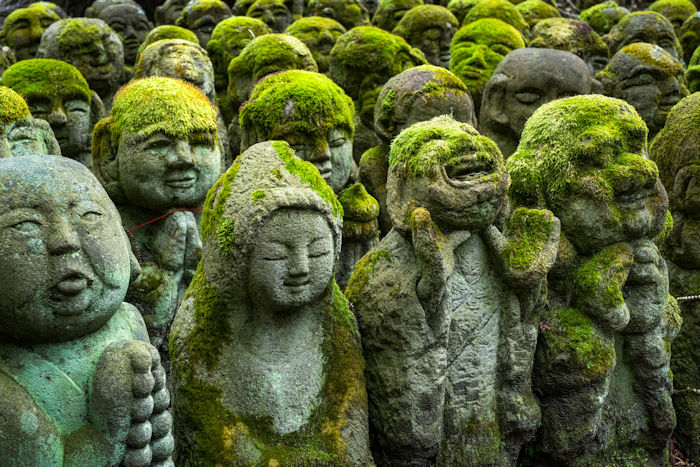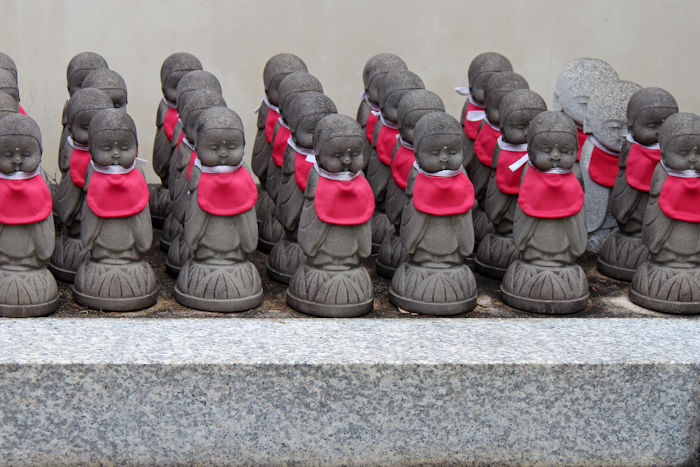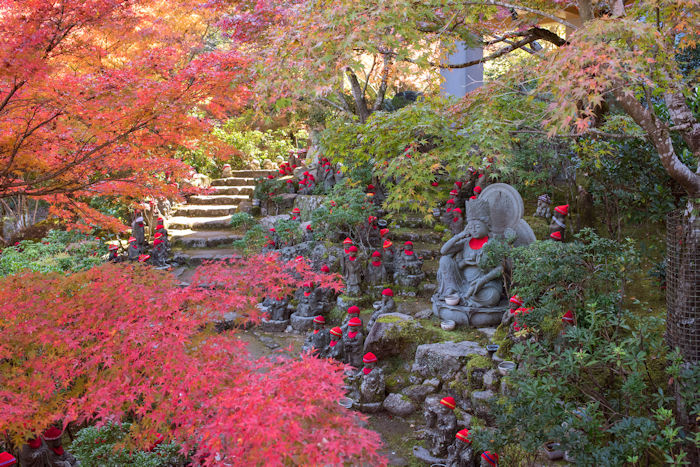Jizo – Protector Of Children, Travelers And Women In Japanese Mythology
Ellen Lloyd - AncientPages.com - As a protector of children, women, and travelers, Jizo (Jizō ) plays an important role in Japanese mythology.
Rows of stoneJizo statues in the Hasedera temple garden in Kamakura. Credit: Adobe Stock - QBE852
When you visit one of the 190,000 temples and shrines or a cemetery in Japan, you can easily find a Jizo statue because they appear in large numbers. Jizo statues are often very cute, and they take on countless forms. They can be male, female, adult, and child. Most often, Jizo appears as a small monk-like figure.
Jizo - One Of The Most Popular Buddhist Divinities
Jizo is the Japanese version of Bodhisattva Ksitigarbha, a Buddhist god worshiped mainly in East Asia. Jizo is, without doubt, one of the most popular and lovable of the Buddhist divinities. He has all the wisdom of the Lord Buddha himself, with this important difference: Jizo has waived aside Nirvana and does not sit upon the Golden Lotus but has become, through exquisitely beautiful self-sacrifice, the divine playmate and protector of Japanese children.
Jizo – Protector Of Children, Travelers, Women And The Weak
Jizo has many functions and duties, but the most important of them all is that he acts as a protector of children and unborn children who died before their parents. According to Japanese Buddhist stories, children who face judgment in the afterlife are doomed to stack rocks on the riverbed of souls in purgatory because they didn't have a chance to build up good karma on earth. Jizo helps these children to cross the river in the sleeves of his robe.
Stone statues at the Otagi Nenbutsu ji temple in Kyoto, Japan. Credit: Adobe Stock - eyetronic
He is the God of smiles and long sleeves, the enemy of evil spirits, and the one being who can heal the wound of a mother who has lost her child in death. Jizo is also the guardian of travelers, women, and the weak.
The Visit Of Jizo Is Much Dreaded
An intriguing custom occurs in Izumo, a Shimane Prefecture, Japan city.
When a wedding occurs in the house of an unpopular man in the country, the village's young men carry a roadside statue of Jizo into the Zashiki and announce the coming of God.
Kyoto, Japan. Credit: Adobe Stock - frdric
God demands food and wine. The family members must come in, salute the deity, and give all the saké and food demanded while any remains in the house. Refusing is dangerous; the young peasants would probably wreck the house. After this, the statue is carried back again to its place. The visit of Jizō is much dreaded. It is never made for persons who are liked.
Jizo Statues Can Be Found All Over Japan
Due to his popularity, we can find depictions of Jizo in many places in Japan. Jizo is the first deity most people encounter when they set foot in Japan. This is because he is the protector of travelers.
You can find Jizo peeking out among the grasses along the road, standing at intersections, overseeing borders, or sitting in a wooden shelter built especially for him. Jizo is at temples too, where sometimes he holds a baby in his arms. He is found at boundaries between physical and spiritual places, between here and there, life and death.
Daisho-in Temple in Miyajima, Hiroshima, Japan. Credit: Adobe Stock - wooooooojpn
Jizo statues are very often carved out of a rock. According to Hank Glassman, associate professor of East Asian Studies at Haverford College in Pennsylvania and author of “The Face of Jizo: Image and Cult in Medieval Japanese Buddhism” the material of the Jizo statue is important. The power of stones to engage the human heart.” Stone is a material that has been worshipped and used for protection since ancient times. Stones having spiritual value predates Buddhism.
Red Maple leaf on the head of Jizo sculpture doll (little Japanese Buddhist monk doll rock) in Japanese Garden.
Credit: Adobe Stock - structuresx
Jizo statues are often dressed in a small red bib around their necks. This practice of dressing Jizo includes hats, robes, or anything one wishes to adorn his figure. Such red bibs were said to have been worn by children earlier. Although the bibs are usually red, representing safety and protection, they can be any color, fabric, or pattern.
Jizo represents a monk; when people dress a monk statue, they accrue merit. Dressing Jizo gives people a chance to interact with him.
Updated on April 2, 2023
Written by Ellen Lloyd – AncientPages.com
Copyright © AncientPages.com All rights reserved. This material may not be published, broadcast, rewritten or redistributed in whole or part without the express written permission of AncientPages.com
More From Ancient Pages
-
 ‘Yunatsite’ And Thought-Provoking Theory That Balkan Peninsula And Not Mesopotamia Was The Cradle Of Civilization
Civilizations | Jan 14, 2023
‘Yunatsite’ And Thought-Provoking Theory That Balkan Peninsula And Not Mesopotamia Was The Cradle Of Civilization
Civilizations | Jan 14, 2023 -
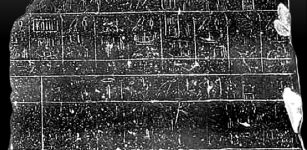 Palermo Stone: One Of The Earliest History Records Of Ancient Egypt
Artifacts | Apr 15, 2016
Palermo Stone: One Of The Earliest History Records Of Ancient Egypt
Artifacts | Apr 15, 2016 -
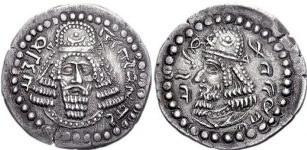 The Rise And Fall Of The Sasanian Empire
Civilizations | Jun 19, 2019
The Rise And Fall Of The Sasanian Empire
Civilizations | Jun 19, 2019 -
 Scientists Unravel Secrets From Ancient Latin Papyrus And Shed New Light On The Roman World
News | Jan 11, 2023
Scientists Unravel Secrets From Ancient Latin Papyrus And Shed New Light On The Roman World
News | Jan 11, 2023 -
 An Intact 4,000-Year-Old Burial Chamber Found In Aswan
Archaeology | Mar 28, 2017
An Intact 4,000-Year-Old Burial Chamber Found In Aswan
Archaeology | Mar 28, 2017 -
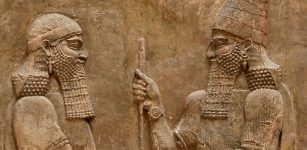 Fragment Of A Royal Memorial Inscription Attributed To Sargon II – Unearthed
Archaeology | May 5, 2021
Fragment Of A Royal Memorial Inscription Attributed To Sargon II – Unearthed
Archaeology | May 5, 2021 -
 Mystery Surrounds Newly Discovered Bronze Age Burial In Southwest England
Archaeology | May 21, 2018
Mystery Surrounds Newly Discovered Bronze Age Burial In Southwest England
Archaeology | May 21, 2018 -
 Amazing Victorian Time Capsule – 135-Year-Old Message In A Bottle Found In Edinburgh
Archaeology | Nov 22, 2022
Amazing Victorian Time Capsule – 135-Year-Old Message In A Bottle Found In Edinburgh
Archaeology | Nov 22, 2022 -
 Mystery Of The Ancient Okunev Culture: Skeleton Of 4,500-Year-Old Noblewoman With Links To Native Americans Discovered In Siberia
Archaeology | Sep 9, 2016
Mystery Of The Ancient Okunev Culture: Skeleton Of 4,500-Year-Old Noblewoman With Links To Native Americans Discovered In Siberia
Archaeology | Sep 9, 2016 -
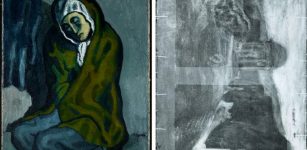 Hidden Details Discovered In Picasso’s Painting The Crouching Woman
Archaeology | Feb 28, 2018
Hidden Details Discovered In Picasso’s Painting The Crouching Woman
Archaeology | Feb 28, 2018 -
 Thousands Magnificent Jade Artifacts Discovered In Han Dynasty Tombs – China’s Golden Age In New Light
Archaeology | Jul 23, 2020
Thousands Magnificent Jade Artifacts Discovered In Han Dynasty Tombs – China’s Golden Age In New Light
Archaeology | Jul 23, 2020 -
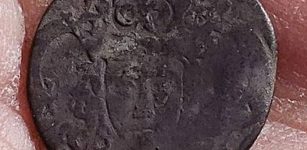 1,000-Year-Old Coin And Other Finds Unearthed During Excavations At Carrignacurra Castle in Cork
Archaeology | Oct 6, 2022
1,000-Year-Old Coin And Other Finds Unearthed During Excavations At Carrignacurra Castle in Cork
Archaeology | Oct 6, 2022 -
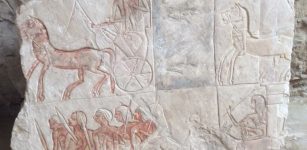 Unusual Scenes Painted On The Walls Inside Egyptian Tomb Of General Iwrkhy – Discovered
Archaeology | May 10, 2018
Unusual Scenes Painted On The Walls Inside Egyptian Tomb Of General Iwrkhy – Discovered
Archaeology | May 10, 2018 -
 Why Did Archaeologists Destroy Medieval King’s Wharf After Excavations?
Archaeology | May 17, 2023
Why Did Archaeologists Destroy Medieval King’s Wharf After Excavations?
Archaeology | May 17, 2023 -
 ‘Exceptionally’ Rare Iron Age Axle Found In Suffolk
Archaeology | Jan 26, 2023
‘Exceptionally’ Rare Iron Age Axle Found In Suffolk
Archaeology | Jan 26, 2023 -
 Human Footprints Of People Who Used Caves Of Ojo Guareña, Burgos 4600 Years Ago
Archaeology | Mar 11, 2021
Human Footprints Of People Who Used Caves Of Ojo Guareña, Burgos 4600 Years Ago
Archaeology | Mar 11, 2021 -
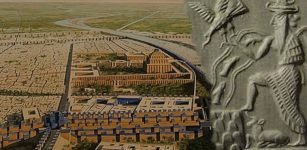 Eridu: Pre-Flood City That Belonged To Enki, God Of Creation, Intelligence, Wisdom And Magic
Civilizations | Mar 27, 2017
Eridu: Pre-Flood City That Belonged To Enki, God Of Creation, Intelligence, Wisdom And Magic
Civilizations | Mar 27, 2017 -
 Vikings’ Hideouts, Harbours And Homes: How Norse Warriors Owed Their Success To Their Encampments
Featured Stories | Feb 17, 2023
Vikings’ Hideouts, Harbours And Homes: How Norse Warriors Owed Their Success To Their Encampments
Featured Stories | Feb 17, 2023 -
 3,800-Year-Old Wall Relief Created By Ancient Caral People Unearthed In Peru
Archaeology | Aug 28, 2018
3,800-Year-Old Wall Relief Created By Ancient Caral People Unearthed In Peru
Archaeology | Aug 28, 2018 -
 Unexpected And Surprising Results Of Ancient DNA Study – Who Were The First People In South America?
Archaeology | Nov 2, 2022
Unexpected And Surprising Results Of Ancient DNA Study – Who Were The First People In South America?
Archaeology | Nov 2, 2022

